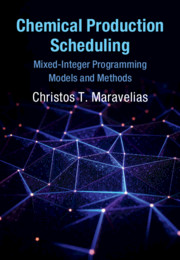Book contents
- Chemical Production Scheduling
- Cambridge Series in Chemical Engineering
- Chemical Production Scheduling
- Copyright page
- Dedication
- Contents
- Preface
- Part I Background
- Part II Basic Methods
- 3 Single-Unit Environment
- 4 Single-Stage Environment
- 5 Multistage Environment
- 6 Multipurpose Environment
- 7 Network Environment: Basics
- Part III Advanced Methods
- Part IV Special Topics
- Index
- References
4 - Single-Stage Environment
from Part II - Basic Methods
Published online by Cambridge University Press: 01 May 2021
- Chemical Production Scheduling
- Cambridge Series in Chemical Engineering
- Chemical Production Scheduling
- Copyright page
- Dedication
- Contents
- Preface
- Part I Background
- Part II Basic Methods
- 3 Single-Unit Environment
- 4 Single-Stage Environment
- 5 Multistage Environment
- 6 Multipurpose Environment
- 7 Network Environment: Basics
- Part III Advanced Methods
- Part IV Special Topics
- Index
- References
Summary
In this chapter, we discuss problems in the single-stage or parallel-units environment. The problem statement is presented in Section 4.1. Three types of models are presented in Section 4.2 (sequence-based), Section 4.3 (continuous time grid-based), and Section 4.4 (discrete time grid-based). In Section 4.5, we present how batching decisions can be handled, and in Section 4.6 we discuss how the three types of models can be extended to handle a new feature, namely, general shared resources. Finally, in Section 4.7 we present extensions on the modeling of general resource constraints using discrete modeling of time. Building upon the material in Chapter 3, we illustrate how some of the modeling techniques introduced for single-unit problems can be extended to account for multiple units. Our goal is to outline some general ideas that the reader can apply to a wider range of problems.We focus on (1) problem features that are new, compared to the ones in single-unit problems (i.e., batching decisions and general shared resources); and (2) new modeling techniques that are necessary to account for these features.
Keywords
- Type
- Chapter
- Information
- Chemical Production SchedulingMixed-Integer Programming Models and Methods, pp. 98 - 127Publisher: Cambridge University PressPrint publication year: 2021



